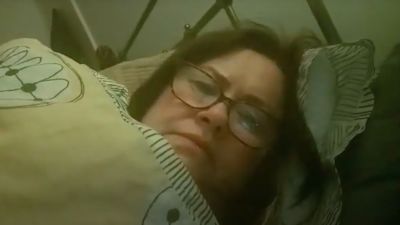'I’ve lost a year of my life': The long term side effects of Covid

Millions of people in Wales have now been vaccinated, the number of reported Covid-19 cases has gone down and the restrictions have eased - but for thousands of people in Wales, the virus is still affecting their health on a daily basis.
Sharon Krause, who lives in Cardiff, said she has ‘“lost a year” of her life trying to secure support and treatment to help with her long Covid symptoms.
“I can’t get up the stairs without being short of breath. So I’m not the person I was before Covid, I’m a different person. It’s hard to accept that.”
In an interview with Y Byd ar Bedwar, Sharon said she believes she caught the virus at the beginning of the pandemic in March 2020, when she woke up extremely tired, and with a headache.
Since then, a number of symptoms have persisted, but Sharon said it has been a struggle to get a definitive diagnosis of long Covid, because she was unable to get a positive test for the virus at the time. Mass testing for Covid-19 wasn’t rolled out in Wales until November 2020.
“I wake up every morning with pins and needles, I’m really thirsty during the night and all day, I’ve been having chest pains like angina, and I’ve also been stuttering. I’ve also got nerve pain down my left arm, I can’t raise my arm behind my back, and I’m really tired. Some days I have to rest or sleep during the afternoon.”
To date, more than 5,500 people in Wales have died from Covid-19, and official figures show that more than 200,000 people have tested positive for the virus.
A recent survey from the Office for National Statistics estimates that more than 50,000 people in Wales suffer from long Covid. Symptoms include difficulty with breathing and tiredness which can last weeks to months after the virus has first appeared.
NHS England has announced an extra £24 million for a network of 80 clinics to assess patients suffering with symptoms of long Covid.
There are calls for a similar model in Wales, but health boards across the country say there are dedicated rehabilitation and recovery programmes available, alongside the national launch of the NHS Wales Covid-19 Recovery App, but there are calls for one specialised clinic.
Rachel Wallbank leads a team of therapists that work as part of the Covid rehabilitation service for Cardiff and Vale Health Board.
She said roughly 400 patients currently use the service - a large proportion of which are women between 35 and 55 years old.
“We aim and hope to help lots of people with their symptoms through online consultations, but the patients can still get access to occupational therapy, physiotherapy, dieticians, speech therapy, as well as support from cardiology departments, respiratory, eurology, immunology.
"There are strategies to help the patients’ recovery journey and a chance to show their progress.” Ms Wallbank said.
Even though Sharon has been referred to this service, and is glad to have the support, she still thinks one specialist clinic in Wales would be a better alternative.
“I’d like to have tests in one clinic where the specialists are all under one roof, and where I can get a ‘person centred approach’ where people can see everything that’s going on... because it takes a lot of energy to go to different referrals with different people and repeating the story time and again - that’s very tiring.”
Rachel Wallbank acknowledged the frustration of patients and said there is no "magic medicine" to take many of the symptoms away.
“There is ongoing research to support this delivery, but actually if a patient is acutely unwell and there are concerns, they can access specialist services", Ms Wallbank added.
"I think that the patients that have come through this service and have been in contact with the team, we’ve always had very positive results. We do know that it is for many a long road that actually they have to play an active part in that recovery and unfortunately we don’t have a magic medicine that will take it away. We empathise with them as well.”
Health Minister, Eluned Morgan MS was unavailable for an interview for the programme. In a statement, a spokesperson for the Welsh Government said:
“Currently health boards are working with GP practices and community services to ensure people with long-Covid can access the services they need, as close to home as possible and in line with National Institute for Health and Care Excellence (NICE) clinical guidance, from primary and community care services. This includes assessment, investigation, treatment and rehabilitation support tailored to their needs.
“People who require more specialist support, which is only available from hospital-based services will be referred via their GP or healthcare professional.”
People with ‘long-Covid’ may experience a very wide range of symptoms and will be directed to the right investigation, assessment, treatment and rehabilitation to meet their specific needs. These services include multi-professional treatment, self-help and advice, online tools to support recovery, investigations, rehabilitation and specialist consultations as required.
“The Minister is exploring the needs people with long-Covid have as part of our plans to ensure the NHS rebuilds from the pandemic and provides a full range of services. and will be engaging with representatives who suffer from the condition in the next weeks in order to formulate a more detailed response.”
You can see the full programme, Y Byd ar Bedwar, on Wednesday, June 9, 8:25pm on S4C or on iPlayer. English subtitles are available.